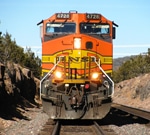
A spokesperson for BNSF, the railroad involved in the derailment, told NGI‘s Shale Daily on Tuesday that the National Transportation Safety Board (NTSB) continues to investigate the May 6 accident, and the company is prevented from disclosing “any information that is germane” to the investigation.
In Washington, DC, an NTSB spokesperson said a final report, including identifying the cause of the incident, is likely to take up to a year, but some interim reports may be issued. NTSB’s Jim Southworth has been the investigator-in-charge.
Read more from NGI’s Shale Daily.

 GENOA, Wis. – Charles Burch was heading to his favorite ice fishing spot, a Mississippi River backwater south of Genoa, when he ran into a railroad detective.
GENOA, Wis. – Charles Burch was heading to his favorite ice fishing spot, a Mississippi River backwater south of Genoa, when he ran into a railroad detective. The nation’s four major railroads are still carrying less freight than they were before the recession. But the last decade has been an exhilarating ride for them nonetheless — an era of growing profits, soaring stock prices and ambitious investments.
The nation’s four major railroads are still carrying less freight than they were before the recession. But the last decade has been an exhilarating ride for them nonetheless — an era of growing profits, soaring stock prices and ambitious investments.